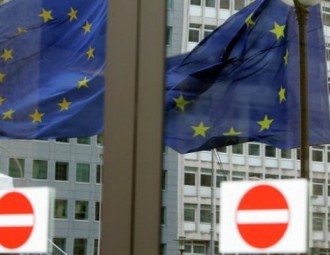Uladzimir Matskevich: Abolition of sanctions opens way to closer Minsk-EU cooperation

Neither Minsk nor Brussels nor Warsaw has clear understanding of how to build the bilateral relations in future.
Further development of the EU-Belarus relations depends on the further evolution of the official Minsk: conducting economic and political changes will result in one scenario, whereas the preservation of the situation inside Belarus will also stop the development bilateral relations.
Uladzimir Matskevich, the head of the Board of the International Consortium “EuroBelarus” told about the reasons and consequences of abolition of the EU sanctions against the Belarusan authorities in the interview with the “EuroBelarus” Information Service.
- The EU has decided to abolish visa limitations against the official Minsk, leaving only four people suspected of political murder under the sanctions. How convincing are the EU’s explanations?
- The EU gave no detailed explanations re the lift of limitations called “sanctions”. The issue has been raised long time ago and it was quite obvious that Europe will make certain concussions to the Belarusan regime.
We need to understand that the reason for change in relations were not the actions of the regime but the geopolitical situation that Belarus is in today. The EU needs to have diplomatic, economic, and even military contacts with Belarus, whereas sanctions make the Belarusan side not very competent; the abolition of sanctions opens way to closer contacts with the official Minsk.
- What is awaiting Belarus – another invasion of European delegations? Why is it necessary?
- Serious commitments or decisions about Belarus can be taken at a high level. But the visits of the European delegations are required if we want to prepare these decisions and understand the position of the official Minsk and the limits to which Lukashenka’s regime can go in normalization on relations with the EU.
Besides, European countries, at least those, for which Belarus is an important link in the international politics, have announced the need to review their relations with Belarus and review the role of Belarus in the region. The review is at the initial state: the EU, European countries haven’t reached the understanding of what they are going to do with Belarus in future. Let’s hope that sooner or later Europe will be more clear in contrast to the previous years, when the EU policy towards Belarus was based according to the "step forward - two steps back" scheme.
- On February 24, Minsk expects the European Union delegation that will discuss the prospects of economic and financial cooperation with the official Minsk. This is the first reconnaissance in force?
- Yes. Only it's not the reconnaissance in force, but collection of information.
- What will the lift of sanctions give the official Minsk and Belarus?
- Almost nothing. We shouldn’t expect anything and shouldn’t be afraid of anything. Sanctions were formal, they had no effect on the domestic economic and political situation; therefore, the abolition of the symbolic sanctions, too, will not affect the events in Belarus.
Developments in Belarus have other reasons than the relations with the EU: it is economic stagnation and economic crisis, related to the collapse of the Russian market. Abolition of European sanctions has exclusively juridical or political effect: the European Parliament and European voters would not understand the high-ranking European politicians, if they were negotiating with the government that is under the sanctions, even if symbolic. In order to establish normal contacts with Minsk the EU had to remove the obstacle - the sanctions imposed on the Belarusian regime. Now the obstacles are eliminated, and contacts with the official Minsk from the judicial and political point of view seem perfectly acceptable.
- What direction will the European-Belarusian relations head further?
- For now Europe has no clear plan for Belarus. Belarus is the only one of the components of the Eastern European politics - both in relation to the six Eastern Partnership countries, as well as in relation to Russia. Belarus plays a certain role in Belarus-Russia relations, though this role is far from independent.
As for the bilateral EU-Belarusian relations, it turns out that neither Minsk nor Brussels, nor, as it turns out, Warsaw has a clear understanding of what to do now. Further development of the European-Belarusian relations will depend on the further evolution, or changes that will be taking place in Minsk. If the official Minsk makes clear irreversible steps towards economic and political transformation, then one scenario of relations will take place; if Minsk doesn’t make these steps, naturally, the Europe-Belarus relations will be exactly the same as during the previous 20 years.
-
03.01
-
07.10
-
22.09
-
17.08
-
12.08
-
30.09








































